Review for Whisper Of The Heart
Introduction
When you think of Studio Ghibli, you invariably think of director Hayao Miyazaki, which is understandable given his status as a master of anime, and a creator of some of the most beloved fairy tales to have come from Japan. His legacy is rapidly becoming as influential and iconic as Walt Disney, and it's no surprise that of all the anime released in the West, it's the Ghibli films that are the most lucrative, outselling other anime by magnitudes. It's easy to forget that Studio Ghibli is staffed with other directors, with differing visions, differing approaches to storytelling, and creating works that are as far removed from the flights of fancy that typify Miyazaki as possible. There is of course long-time Miyazaki collaborator Isao Takahata, who worked with Miyazaki as far back as The Little Norse Prince and Panda go Panda. He's created films for Ghibli like the reflective slice of life Only Yesterday, the surreal Pom Poko, and the harrowing war movie Grave of the Fireflies. Whisper of the Heart was directed by Yoshifumi Kondo, indeed was the only film that he directed before his untimely death. It's a slice of life story, a little drama, a little comedy, a fair bit of teen romance, and it is most definitely an urban fairy tale of sorts, but it's a fairy tale unlike any other Ghibli movie.
Shizuku Tsukishima is a middle school girl who lives with her family. She's something of a bookworm with a love of stories, a passion that her parents indulge. Her older sister would rather that she buckle down and study, especially as her exams are approaching, which will determine which high school she goes to. She's more determined to read 20 books over the summer holidays, vicariously cheer her friend Yuko on in romance, and finish a school project to translate a pop song, Take Me Home, Country Road. That changes one day when she notices a name appearing in all the library books that she borrows. Apparently, someone named Seiji Amasawa has been borrowing the same books that she reads. Her imagination is soon working overtime picturing who this boy might be. At the same time, she meets the most infuriating boy when she forgets a book of fairy tales that she borrowed from the library. It's when she encounters a strange cat commuting on a train, and she follows it to an antique shop where the boy works making violins, that she learns that the infuriating boy and Seiji Amasawa are one and the same. A friendship gradually develops, she's fascinated by his skills crafting violins, while he encourages her to develop her talents as a writer, but it seems that they are destined to be apart.
Picture
Whisper of the Heart gets a 1.85:1 anamorphic transfer, but with the thin black lines top and bottom, it's closer to 2.00:1. It's a Film to PAL transfer, so the image is clear and sharp throughout, of high resolution, and free of the usual standards conversion artefacts that anime is prone to. The character designs are typical Ghibli, but there is a very realistic feel to the design, set in suburban Tokyo, with its bustling crowds and high-density living. It's a slightly subdued, earthy palette of colours for the most part, but there are hints of magic dotted through the film, whether it's some gorgeous skies, the hilly location of Shizuku's neighbourhood allowing for some impressive views, or the Aladdin's cave that is the antiques shop run by Seiji's grandfather. There is also the fantasy sequence featuring the Baron, which takes us into a pure fairy tale, a sequence that was directed by Hayao Miyazaki. The animation is stunning. It's not necessarily flashy or overblown, but if Ghibli is renowned for one thing, it's observing human behaviour, and the way that the characters in this movie are animated is so realistic that at times the animation becomes invisible.
Sound
You have a choice between DD 5.1 English and Japanese, with the menu allowing you to choose from English, Japanese with translated English subtitles, and English with hard of hearing English subtitles (a.k.a. dubtitles), so you don't get them mixed up. The film opens with Take Me Home, Country Road by Olivia Newton John, and it's a song that sets the theme and tone for the film, although thereafter we hear various versions of Shizuku's translations. It isn't necessarily a surround intensive film, but the immersion is enough to convey the ambience and establish a mood. I was perfectly happy with the Japanese audio and the subtitles, but the dub from Disney is very good, very naturalistic, and Cary Elwes as the Baron is very suited to the character.
Extras
The disc gets animated menus and a jacket picture to look at when the disc isn't spinning. It's presented in a white Amaray case, and is #11 in the Ghibli line from Optimum.
On the disc, you'll find 11 minutes worth of trailers for the film, which comprise 5 theatrical trailers, and a 5-minute promo film that was put together prior to the film being dubbed.
As usual for an Optimum Ghibli disc, you get the alternate angle storyboards, allowing you to watch the film all the way through in its original, pencil sketch form. I have never actually used this facility in any of the Ghibli films that I own.
The Background Artwork "The Baron's Story" is a five-minute slideshow that unsurprisingly looks at the background artwork.
The Howl's Moving Castle Trailer is here, as well as The Studio Ghibli Collection Trailer (12 minutes) that offers snippets from all the films from Nausicaa up to Howl's Moving Castle.
Conclusion
If the only Ghibli that you have seen comes from the mind of Hayao Miyazaki, then you'll be in for a surprise with Whisper of the Heart. This film isn't about the magic, it isn't about the fantastic, and it is free of any supernatural elements. There are no witches on broomsticks, no flying pigs, no little girls spirited away, and no castles in the sky… or on legs. Whisper of the Heart is very much a grounded, suburban drama, a slice of life that is very much set in the real world. That isn't to say that there is no magic in it. But this is the magic that the characters bring out from within, rather than part of the world. There are transformations, but transformations of character, as you would expect in any coming of age story. It's a small, quite personal story, a tale of first love and teen romance, of exploring new feelings and growing up, finding a path to adulthood. Yet I find this to be one of Ghibli's most magical films, as it warms the heart and makes the soul soar in ways that that other Ghiblis rarely attempt.
It's an odd film, in that it feels like a series of moments, of vignettes that somehow coalesce into a coherent narrative. There is a story unfolding, but you hardly realise it as you follow Shizuku Tsukishima's day-to-day life, beginning when we encounter her during the summer holidays prior to her final year of middle school. It seems as if she's at that point where every decision will be a momentous one that will determine the subsequent course of her life, and she's intent on delaying that as long as possible, indulging instead her passion for reading. It becomes apparent that she has a talent for writing and poetry as she's translating (rewriting in the English dub) the lyrics to a pop song so that the school choir can sing it. Her parents indulge her escapism, although her older sister Shiho is far more critical, even though she admits that she's at university still trying to make those big decisions. But as so often happens, life has a tendency to occur even while you wait for the big moments to arrive.
Shizuku indulges her imagination, she sees stories in random everyday happenstance, and when she keeps seeing the same name in all the books that she borrows from the library, she begins to wonder at who the boy is that borrows the books before her. Then when she sees a cat bizarrely commuting on the railway, she follows it, thinking that it can only lead to a fantastic and magical story. In a Hayao Miyazaki story, it would, but here the cat only leads her to an out of place antiques store, and the boy who's been borrowing the same library books as her. Seiji Amasawa a lot more centred and focused in what he wants to do. He spends his time at his grandfather's store, training to make violins, and despite an initial mutual antagonism, a friendship develops between the two that begins to blossom into something more.
That is threatened when Seiji tells her that he wants to formalise his training, and be apprenticed to master craftsmen in Italy. It crystallises an idea in Shizuko's mind, that she can only be worthy of Seiji if she is an equal. He's impressed with her writing, with the way that she translates lyrics, so she decides to see if she has the talent and the commitment to be a writer. Inspired by an enigmatic statuette in the antique shop, she decides to write the Baron's tale, and if she can write it during the two months that Seiji will be in Italy on a trial period, then she'll have proved to herself that she is capable. It's the tale of a girl learning about herself, becoming more confident in her abilities, at that age when children really start to engage with the world and embrace the possibilities of what they can actually become. It's a faltering, tentative process, where the right guidance and advice can work wonders, but even the smallest setbacks seem disastrous. Whisper of the Heart captures that delicate cusp of adulthood with ease, and it's a story that everyone can relate to.
Whisper of the Heart is a film full of magical moments, whether it is the adventure with the fat cat, the impromptu folk song in the antique shop, something as simple as a sunrise, and of course Shizuku's imagination as she creates the Baron's tale. It's a heart warming tale of first love, a delightful coming of age story, told with tenderness and a light touch, with magical animation that takes you into another world. Whisper of the Heart is one of my favourite films from the Ghibli catalogue, and very warmly recommended. It would also later spin off The Cat Returns, where The Baron does actually come to life…
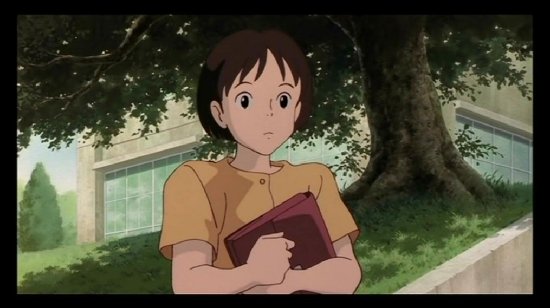
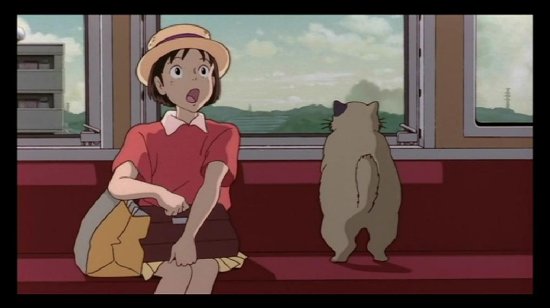
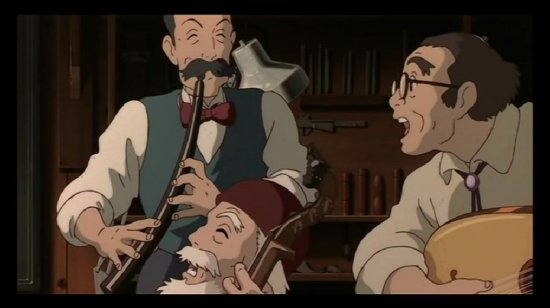
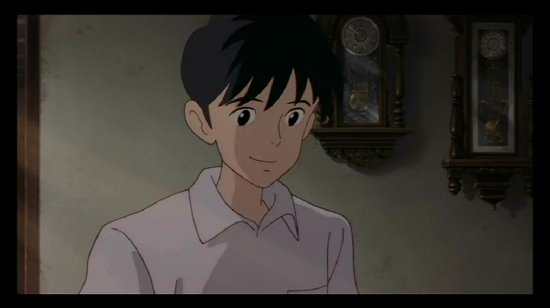
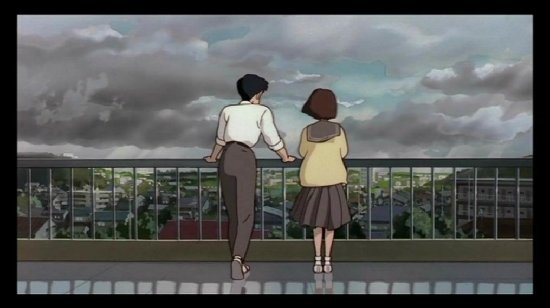
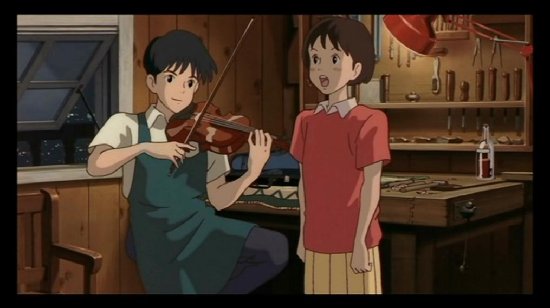
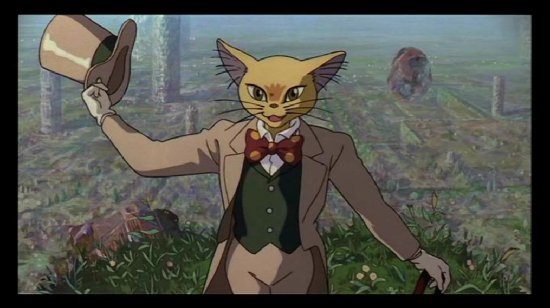
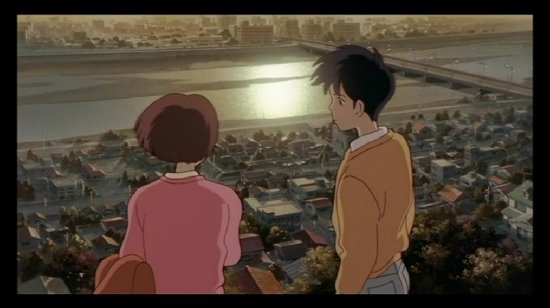
Your Opinions and Comments
Be the first to post a comment!